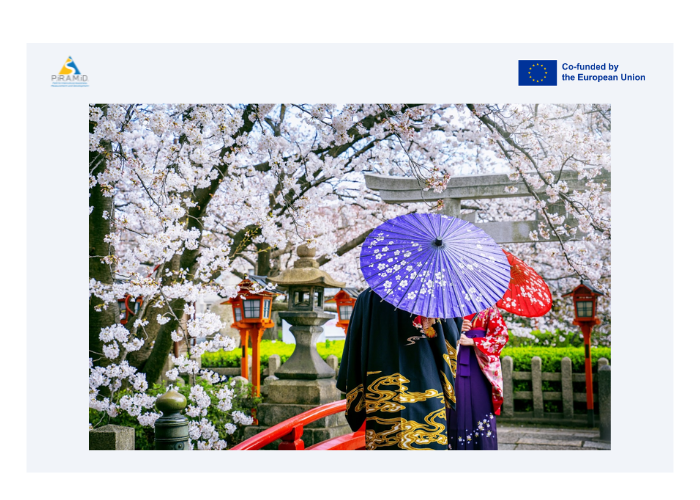This website use cookies to ensure you get the best experience on our website

P.IR.A.M.iD
2023-1-ES01-KA220-VET-000157060
Japanese culture: Harmony and hierarchy
5 November 2024

For over 250 years Japan was isolated from the other cultures, allowing it to develop a distinct culture centered on cooperation, harmony, and interdependence. Even after opening up in the 19th century, these values remained deeply embedded, creating what Richard Lewis describes as a unique “web society” where social roles are interconnected and obligations are prioritized both across and within groups. Respect for hierarchy is paramount; senior individuals are expected to mentor and protect juniors, who, in turn, show respect and loyalty. This hierarchical structure extends to the workplace, where loyalty often outweighs individual capability, thereby strengthening group cohesion.
Japanese cultural values, instilled from a young age, prioritize honesty, humility, and respect. Social obligations, particularly to family and community, are fundamental, with great importance placed on “saving face.” Punctuality and hospitality reflect respect for others, while relationships are strengthened by reciprocal obligations. Japanese behavior is marked by modesty, avoidance of confrontation, and a high regard for silence, which conveys respect and understanding.
Language reinforces these cultural values, as Japanese communication is often indirect, employing impersonal verbs and polite forms that avoid assigning blame. This subtlety enables non-confrontational interactions, aligning with the culture’s emphasis on respect and harmony. In business, consensus-building is central, with decisions made after careful discussion to ensure unity. Though this can slow decision-making, it fosters strong solidarity, contributing to Japan’s corporate success globally. However, this commitment to harmony may sometimes limit individual creativity.
Japan’s cultural framework, as described by Richard Lewis, highlights the value of collective harmony, respect, and loyalty. These values have shaped Japan’s social and professional environments into spaces where cooperation and respect are deeply valued, sometimes at the expense of individual expression. As Japan continues to adapt in a rapidly changing world, it will be fascinating to see how this balance between tradition and innovation evolves.
References: Richard D. Lewis, “Japan” in: When cultures collide: Leading across cultures 3rd ed. Nicholas Brealey International, 2006, pag. 509-520

This project has been funded with support from the European Commission.
This publication reflects the views only of the authors, and the Commission cannot be held responsible for any use which may be made of the information contained therein.
